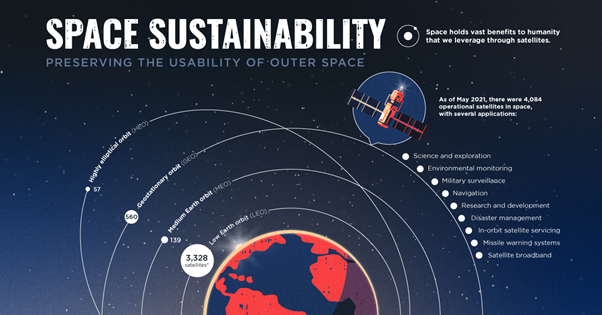UK hosts fourth Summit for “Space Sustainability”
Context
Recently, the U.K. hosted the fourth summit for Space Sustainability in London in collaboration with the Secure World Foundation.
What is Space Sustainability?
- Space sustainability refers to the ability of all humanity to continue to use outer space for peaceful purposes and socioeconomic benefit over the long term.

|
As outer space is considered a shared natural resource, the United Nations Committee on the Peaceful Uses of Outer Space (COPUOS) 2019 adopted a set of 21 voluntary, non-binding guidelines to ensure the long-term sustainability of outer space activities. |
The need
- Orbital crowding: The earth’s orbital environment has more than tripled in the past decade. One of the hot issues when it comes to space sustainability is orbital crowding.
- Increasing players: As the cost of missions reduces and the number of players increases, the complexity of missions and slot allotment issues also increase.
- Threat to on-going operations: It poses a direct threat to the operations and safety of a mission and is likely to cause legal and insurance-related conflicts.

- Risk of collisions and interference: With the emergence of large constellations and complex satellites, there is a risk of collisions and interference with radio frequencies.
- Increasing space debris: Space debris is another prominent issue.
- Space weather threats: Other causes of concern are solar and magnetic storms which potentially damage communication systems.
- Threats: Unsustainable use of space can threaten the:
-
- National and international security
- Earth observation
- Telecommunications
- Satellite navigation
- Scientific exploration
- Economic development
U.K. plan for space sustainability entail
- The U.K. calls for an “Astro Carta” for space sustainability, based on the Artemis Accords model for sustainable space exploration.
- The U.K. Space Sustainability plan mentions four primary elements:
- to review the regulatory framework of the U.K.’s orbital activity
- to work with organisations such as the G-7 and the UN to emphasise international engagement on space sustainability
- to try and develop safety and quality-related metrics that quantify the sustainability of activities
- to induce additional funding of $6.1 million on active debris removal
India stands on space sustainability
- India is well on its way to create a subsystem that addresses global sustainability questions.
- The headquarters of the Indian National Space Promotion and Authorisation Centre (In-SPACe) was formally inaugurated last month.
- One can expect an increased role of the private sector in India’s space activities.
- The ISRO has initiated ‘Project NETRA’ to monitor space debris.
- To provide in-orbit servicing, ISRO is developing a docking experiment called ‘SPADEX’.
- It looks at docking a satellite on an existing satellite, offering support in re-fuelling and other in-orbit services while enhancing the capability of a satellite.

